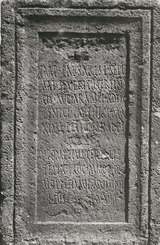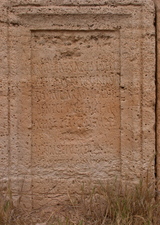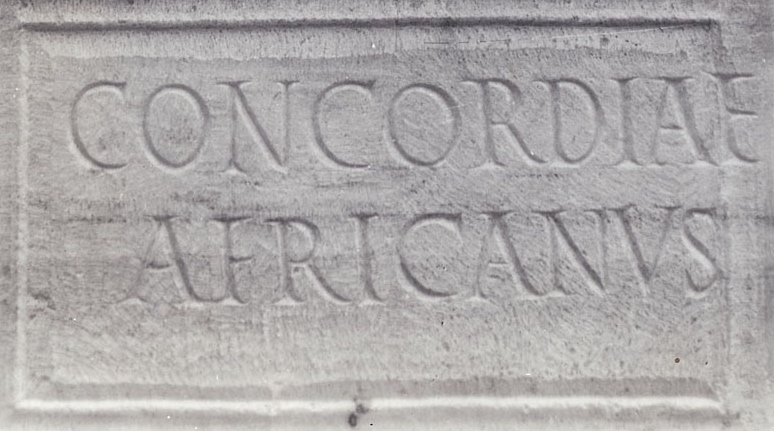Description: Rectangular base
(w:
0.51 x h:
0.81 x d:
0.51) of rather coarse grey limestone.
Text: Inscribed on one face within a moulded panel (die,
w:
0.29 x h:
0.59).
Letters: Rustic capitals: 0.03-0.035.
Date: CE 209-211 (reign)
Findspot:
Lepcis Magna:
Forum Vetus, Temple of Hercules (see 433).
Original location: Unknown
Last recorded location:
Findspot
Interpretive
⟦P(ublio) [Septimio Geta]e
( vac. ) Aug(usto)⟧ ( vac. )
Imp(eratoris) Caesaris L(uci) Septi-
mi Seueri Pii Pertina-
5cis Aug(usti) Arabici Adia-
benici Parthici ma-
ximi felicissimi p(atris) p(atriae)
( vac. ) [⟦filio⟧] ( vac. )
Q(uintus) Pompeius Cerealis
10Felix proc(urator) Augg⟦g⟧(ustorum) de-
uotissimus numini
eius ( vac. ) posuit
Diplomatic
⟦P[............]E
AUG⟧
IMPCAESARISLSEPTI
MISEUERIPIIPERTINA
5CISAUGARABICIADIA
BENICIPARTHICIMA
XIMIFELICISSIMIPP
[.....]
QPOMPEIUSCEREALIS
10FELIXPROCAUGG⟦G⟧DE
UOTISSIMUSNUMINI
EIUS POSUIT
English translation
Translation by: J. M. Reynolds
To Publius Septimius Geta Augustus, son (all erased ) of emperor Caesar Lucius Septimius Severus Pius Pertinax Augustus, victor in Arabia, victor in Adiabene, greatest victor
in Parthia, most fortunate, father of the country; Quintus Pompeius Cerealis Felix, agent of the three (two after erasure) Augusti most devoted to his divine power, set this up.
Bibliography: IRT, 1952, 444, whence IRT, 2009, 444, whence EDH 059347; for BSR images see BSR Digital Collections.
Images
 Fig. 1
Fig. 1. Ward-Perkins Archive, BSR (Sopr. CLM 837)
 Fig. 2
Fig. 2. Face: Tantillo (2005)


